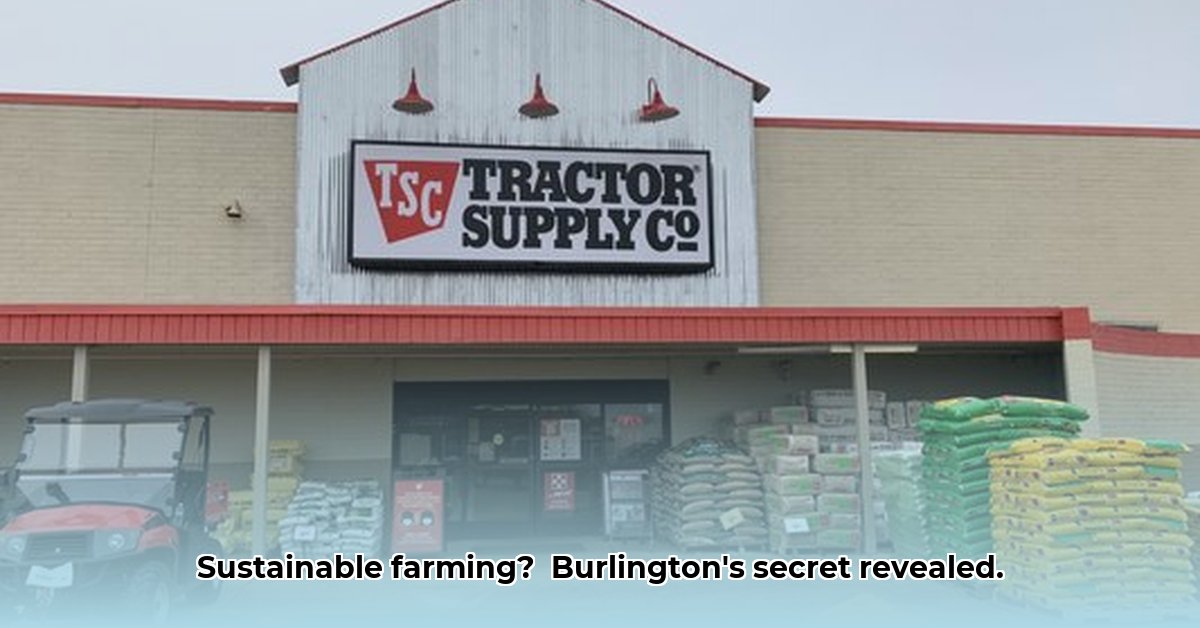
Tractor Supply in Burlington, NC: A Local Hub for Sustainable Agriculture?
Tractor Supply (TS) in Burlington, North Carolina, plays a significant, albeit indirect, role in the sustainability efforts of local farmers. While not explicitly marketed as a champion of sustainable agriculture, TS serves as a crucial supplier for a wide range of farming needs, offering products that, when used responsibly, can contribute to environmentally sound practices. However, the extent of TS's positive impact and the potential for improvement necessitate a closer examination. This article explores both the advantages and drawbacks of relying on TS for sustainable farming in Burlington. For more information on Tractor Supply's management, see their manager salary information.
Do Burlington farmers rely too heavily on a single supplier for their sustainable farming needs, neglecting potentially more eco-conscious alternatives?
Supporting Local Farmers: Convenience and Community
For many Burlington farmers, TS provides convenient access to essential supplies, from seeds and feed to tools and irrigation systems. This localized access reduces fuel consumption and transportation costs, resulting in a smaller carbon footprint compared to sourcing materials from more distant suppliers. This convenience translates to significant time savings for busy farmers. Beyond logistical benefits, TS often acts as a community hub, fostering informal knowledge sharing and advice exchange among farmers—an invaluable resource, particularly for smaller operations.
The Indirect Influence: A Double-Edged Sword
While TS offers products that can support sustainable practices (organic seeds, energy-efficient irrigation systems, composting tools), the company's lack of transparency about its own supply chain presents a significant challenge. Crucially, information regarding the origin of its products and the sustainability of their manufacturing processes is largely unavailable. Where are the fertilizers sourced? What are the environmental impacts of producing the fence posts? How energy-efficient are the manufacturing processes themselves? These unanswered questions prevent an accurate assessment of the overall environmental impact associated with using TS products. Further, the company hasn't publicly released data on its own operational sustainability, hindering a complete understanding of its environmental footprint.
How significantly does the lack of transparency in Tractor Supply's supply chain hinder the assessment of their true environmental contribution to Burlington's agricultural sector?
The Potential for Partnership: A Call to Action
Despite these limitations, TS possesses immense potential to become a more proactive force in promoting sustainable agriculture. This requires a collaborative effort involving the company, farmers, the community, and environmental organizations. The company's role transcends simple product provision; it's about actively fostering a community dedicated to responsible agriculture.
A Roadmap for the Future: Concrete Steps for Growth
Realizing this potential demands significant proactive measures.
For Tractor Supply Management:
- Short-Term (0-1 year): Commission a transparent, third-party audit of its entire supply chain, focusing on sustainability metrics. Publicly release the findings and engage with the community to address identified concerns.
- Long-Term (3-5 years): Develop and publish a comprehensive sustainability program with quantifiable goals (e.g., reducing carbon footprint by a specific percentage, increasing sustainably sourced products).
For Burlington Farmers:
- Short-Term: Utilize in-store resources and seek advice from knowledgeable staff to enhance sustainable farming practices.
- Long-Term: Actively participate in educational opportunities and workshops focusing on advanced sustainable agricultural techniques.
For the Burlington Community:
- Short-Term: Support local sustainable food initiatives (farmers' markets, community gardens) by purchasing locally and participating in community events.
- Long-Term: Partner with local schools and universities to create environmental awareness programs focused on sustainable agriculture.
For Environmental NGOs:
- Short-Term: Collaborate with TS on joint projects focusing on sustainable agriculture education and outreach.
- Long-Term: Explore developing a certification program for environmentally friendly products sold at TS, similar to existing certifications.
What specific metrics should Tractor Supply use to measure the impact of the proposed initiatives on sustainable agricultural practices within the Burlington community?
How to Source Sustainable Farming Products from Tractor Supply
- Define Your Needs: List materials needed for your sustainable farming practices (organic seeds, compost, etc.).
- Verify Certifications: Look for certifications like USDA Organic or Demeter Biodynamic on products.
- Check Packaging: Opt for packaging from recycled materials and recyclable options.
- Engage TSC Staff: Inquire about sustainable product options available.
- Utilize TSC's Website: Research products aligned with your sustainable goals, examining customer reviews.
- Compare Costs and Sustainability: Assess the long-term benefits of more expensive, sustainably produced products.
- Seek Alternatives: If TSC lacks specific sustainable products, explore other local suppliers or online retailers.
TSC's Sustainability Initiatives: Progress and Challenges
While TSC has set sustainability goals and made progress in areas like carbon emissions reduction, further efforts are needed, particularly regarding supply chain transparency and detailed water conservation initiatives. Their commitment to diversity and inclusion is commendable, but increased transparency regarding the specifics of their sustainability goals is crucial for both farmers and the community. Transparency and accountability are key to building trust and driving meaningful change.
What additional steps could Tractor Supply implement to improve transparency in their environmental initiatives and build greater trust with the Burlington community?
TSC and the Burlington Community: A Shared Responsibility
TS's role in supporting sustainable agriculture in Burlington is a collaborative effort. The store’s success and the success of its customers are intricately linked to the health of the local farming community and the environment. Informed choices by Burlington farmers can directly influence the range of sustainable products offered by Tractor Supply. The partnership between TS and the broader community is absolutely paramount to ensuring the long-term sustainability of the local agricultural system.